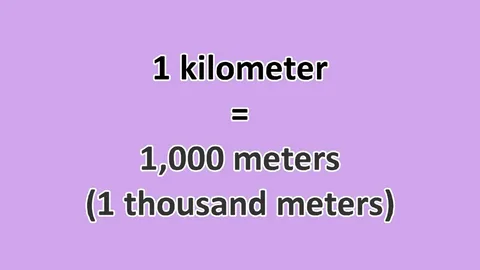In the world of metric conversions, one question often pops up: how many kilometers in a meter? At first glance, this might seem like a tricky question, especially if you’re not used to working with metric units. But don’t worry. We’re going to make this super easy to understand.
Whether you’re working on a school project, handling construction data, or just brushing up your general knowledge, this guide walks you through everything. Plus, we’ll throw in some helpful tricks and real-life examples along the way.
Understanding the Basics: What is a Meter?
Let’s start with the foundation.
A meter (m) is the standard unit of length in the metric system. It’s widely used around the world and serves as a base unit in scientific, commercial, and everyday settings.
To give you some perspective:
- A doorway is usually just over 2 meters tall.
- A guitar is about 1 meter long.
- A small car might be around 4 meters in length.
Now, What is a Kilometer?
A kilometer (km) is also a unit of length, but is much larger than a meter. The word “kilo” means 1,000—so a kilometer is essentially 1,000 meters.
This unit is mostly used for measuring long distances:
- Roads
- Running tracks
- Travel routes
So when someone says they live “5 kilometers away,” they’re saying they’re 5,000 meters away.
The Simple Conversion: From Meters to Kilometers
Here comes the answer you’re looking for.
1 meter = 0.001 kilometers
That’s it. That’s the golden formula.
To convert meters into kilometers, you simply divide the number of meters by 1,000.
Let’s break it down:
| Meters | Formula | Result (in Kilometers) |
|---|---|---|
| 1 m | 1 ÷ 1000 | 0.001 km |
| 100 m | 100 ÷ 1000 | 0.1 km |
| 500 m | 500 ÷ 1000 | 0.5 km |
| 1000 m | 1000 ÷ 1000 | 1 km |
Why It Matters (More Than You Think)
Now, you might wonder—why do I even need to know this?
Fair question. But this conversion helps in so many areas:
- Planning travel distances
- Reading speedometers
- Understanding sports stats
- Building measurement systems
- Converting maps and GPS data
So yeah—it’s more useful than it seems at first glance.
A Real-Life Example to Make It Stick
Let’s say you’re measuring a running track. You find out the track is 400 meters long. How many kilometers is that?
Here’s the simple math:
400 meters ÷ 1000 = 0.4 kilometers
So the track is 0.4 kilometers long. That’s helpful if you’re logging your distance on a fitness tracker that uses kilometers instead of meters.
How to Remember the Formula Easily
Not good with numbers? No stress. Try this mental trick:
“Kilo means a thousand. So take the meters and move the decimal three places to the left.”
Example:
- 1000 meters → move decimal 3 steps → 1.000 km
- 250 meters → move decimal 3 steps → 0.250 km
- 5 meters → move decimal 3 steps → 0.005 km
Boom. Done.
Convert On the Go: Use a Quick Online Tool
While it’s good to understand the formula, let’s be honest—we all love shortcuts. That’s where online converters like Whatever Converter come in. Just enter your meter value, and you’ll get the answer instantly in kilometers.
Especially helpful when:
- You’re in a hurry
- Working on bulk data
- Double-checking your math
So don’t hesitate to bookmark a conversion tool you trust. It can save you a lot of time and brainpower.
Common Mistakes People Make
Let’s talk about what not to do.
- Mixing up meter and kilometer scales – Many people think 100 meters is 1 kilometer. Not true. It’s only 0.1 km.
- Adding zeros the wrong way – Always divide, don’t multiply.
- Confusing feet or miles with metric units – These are different systems. Stick to one system when converting.
Being mindful of these common mix-ups will help you stay accurate.
Why the Metric System is So Easy (Once You Get Used To It)
One of the best things about the metric system is how consistent it is. Everything goes up or down by powers of ten. No weird numbers. No fractions.
Just remember:
- 1 kilometer = 1000 meters
- 1 meter = 100 centimeters
- 1 centimeter = 10 millimeters
It’s like stacking blocks—each unit builds on the other.
Quick Reference Table: Meters to Kilometers
Here’s a handy chart you can refer to anytime:
| Meters | Kilometers |
|---|---|
| 1 | 0.001 |
| 10 | 0.01 |
| 50 | 0.05 |
| 100 | 0.1 |
| 250 | 0.25 |
| 500 | 0.5 |
| 750 | 0.75 |
| 1000 | 1 |
| 5000 | 5 |
| 10,000 | 10 |
Keep it as a note in your phone—or better yet, remember the rule of dividing by 1000.
Want to Go the Other Way Around?
Now, if you’re wondering the reverse—how many meters are in a kilometer—the answer is even simpler:
1 kilometer = 1,000 meters
So:
- 5 kilometers = 5,000 meters
- 10 kilometers = 10,000 meters
Same logic, just the other way around.
Final Thoughts
So next time someone asks, “How many kilometers in a meter?”—you’ll have a clear answer: 0.001 kilometers. It’s a tiny distance, but it’s part of a system that helps us measure the world accurately.
And remember, every big journey starts with a meter. Whether you’re running, walking, building, or just learning, understanding metric conversions makes life a little smoother.
Need More Conversions?
That’s what we’re here for. At Whatever Converter, we simplify all sorts of unit conversions—from meters to miles, inches to centimeters, and everything in between. No confusion, just clarity.






Leave a Reply